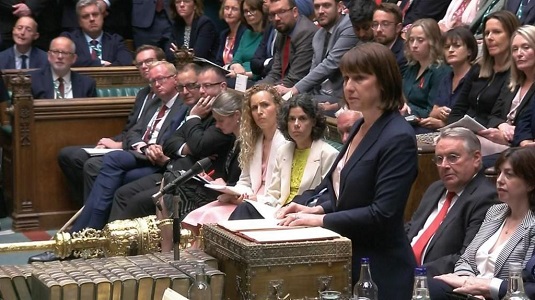
For political reasons, the government persists in treating state finances like a household budget. This isn't because Reeves or the cabinet really believe this (though the same cannot be said of many a clueless MP of every political persuasion), but it's useful for managing expectations. Whereas the previous government did this by promising nothing and defunding public services so state provision got such a bad name that no one would demand more, Labour's approach is to depoliticise politics and render it a technocratic exercise in which the bottom line is the bottom line, no questions asked. Hence our fearless "no one tells us what to write" press might quibble about this or that decision, but not challenge the framing of what "needs" to be done.
Nevertheless, going after Winter Fuel Payments is a strange one. Yes, Reeves caveated this with a campaign to sign up more pensioners who are eligible and don't claim, but unlike income tax thresholds the cut off is brutal. A few pounds over the qualifying line and its removal will make someone worse off than those just under it. But savings? On the one hand the introduction of a means test will put more off claiming, regardless of whatever Liz Kendall-designed initiative is launched to encourage take up. On the other, this creates delays in the system and the necessity of employing more civil servants to administer payments. In that sense, it's an under-the-radar pledge fulfilled. The manifesto, after all, implied a public sector job creation scheme.
Will there be a political price to pay? It's provided something for Tory leadership contenders to rail against as they try and rebuild their shattered coalition, but without any elections due until next May's locals and the general election four or five years off it's unlikely this will be top of the issue pops. Especially as Reeves has scheduled her budget for 30th October. There will be plenty of other issues exercising politics after then.
However, above inflation pay rises across the public sector and the big rise in junior doctors' salaries has almost certainly avoided another round of strikes in hospitals and schools. Who says industrial action doesn't work? But this is consistent with what you might call the Starmerist programme. I.e. the modernisation of the state and restoration of its functions as well as its authority. Of course, the concessions on pay do not address over a decade of salary erosion but it makes for a good start to the government's industrial relations and is therefore good politics as far as Labour is concerned. By offering more money from the off, unions will be minded to be less confrontational in future negotiations. Also, because there is something demonstrable and tangible to show this early in the new government - something more than piss and wind - we might get back to a situation where unions can be counted on to moderate and police workplace demands. Which is partly the object of Keir Starmer's enthusiasm for them. They, not managers, can be the most effective means for tempering and disciplining labour.
There was devil hidden in Reeves's detail. She said all departments will be given savings targets with the aim of finding £3bn between them. This apparently is supposed to be through dispensing with consultants (which will have the knock on effect of improving institutional skill pools and memory in lieu of anything else) and "back office" savings. How this won't impact the delivery of services Labour are committed to renewing after 14 years of cuts remains to be seen. Some road and rail projects have also got the axe, including the ridiculously stupid Stonehenge tunnel. Actual tax rises, which everyone knows are coming, are going to wait until the budget.
In all, what Reeves delivered was a speech that was almost entirely expected. The junior doctors' settlement was a surprise, and before today she could have done the "tough choices" routine on public sector pay. But this concession and everything else that was given and taken away is consistent with their authoritarian modernisation project. We can expect future financial statements and budgets to adopt exactly the same tone.
Image Credit
The pay deal with the junior doctors is a welcome sign of what trade unionism can achieve. Now we need some of it for the low paid. But Labour in Opposition would have torn a Conservative Government to pieces if it had tried to means test the winter fuel payment. Not so much as to have restored universality in office. But even so.
ReplyDeletePensioners are famously hard to reach with means tested benefits, and energy bills are 92 per cent higher than they were in 2021, but Keir Starmer and Rachel Reeves are surrounded by nepo babies who have no idea why anyone would need the winter fuel payment. Come the next General Election, then the pensioners will not blame a Government that had left office five years earlier. Nor should they.
And when those pensioners, who only have the state pension and don't qualify for means-tested benefits, become ill (or worse) from heat or eat choices, thereby putting more pressure on health services, will Reeves take responsibility? Of course not.
ReplyDeleteYet it's ok for her to claim huge fuel expenses, let alone abuse her parliamentary credit card to the point of suspension. Despicable person.